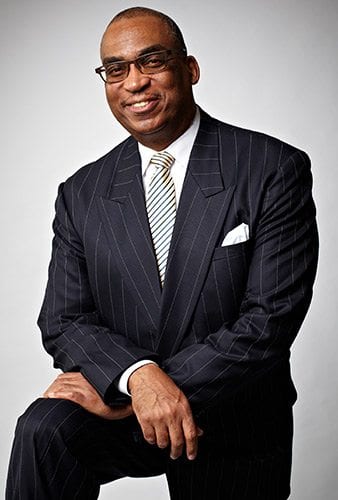Steven Rogers – Harvard Business School Professor and successful entrepreneur
Four lessons for launching successful ventures.

At Harvard Business School, Steve Rogers teaches select students from around the world how to be successful entrepreneurs, drawing upon his two decades as a business professor at elite universities and his own experience owning profitable companies.
Yet Rogers, who rose from growing up on welfare in Chicago to earning his MBA at Harvard, is no chin-stroking, ivory tower guy who confines his lecturing to the lofty campus along the banks of the Charles River in Allston. He gets around, offering his sage, informative advice to business gatherings around the country and to African American audiences locally.
“I’m a regular brother interested in improving the condition of black America,” he said.

Steven Rogers and Asian Institute
Rogers believes in the “Talented Tenth” philosophy of W.E.B. DuBois which states that successful African Americans should transmit their skills to the black community to uplift its other members. To white audiences, he makes the pitch that helping black-owned business grow and increase the community’s wealth is good for Boston and the country.
So how to do that? Rogers offered a detailed tutorial on the obstacles that confront aspiring and existing black business owners and different ways to overcome them.
Some obstacles, like financing and business knowledge, Rogers said, beset entrepreneurs of every description. But limited intergenerational wealth, he added, presents a bigger challenge for African Americans.
Attitudes and traditions in the black community can also self-limit aspiring entrepreneurs, Rogers suggested.
To many, going into business means starting a new company and owning it outright, then making just enough profit to support an upper middle-class lifestyle. Securing financing means applying for a bank loan. Learning management skills means on-the-job training.
“That’s one of our roadblocks — we only think about going the entrepreneurial route via startup,” Rogers said. “I teach people what I call the “entrepreneurship spectrum,” that you can go the entrepreneurial route via acquisition, via franchising or via startup. I went the entrepreneurial route via acquisition.”
Right out of Harvard Business School, Rogers rejected an offer in the early 1980s to buy an underperforming McDonald’s franchise on Summer Street in downtown Boston. Instead, he acquired two lampshade manufacturers in Illinois.
Few African American businesses manufacture products, and his had nothing to with black culture. Rogers demonstrated hands-on management skills and parlayed the companies into financial success.
In the mid-1990s, Rogers joined the faculty at the Kellogg School of Management at Northwestern University, where he won multiple teaching awards. He arrived at Harvard Business School in 2012.
In sharing lessons in entrepreneurship, which his Harvard students pay for dearly, Rogers related his own experiences in business to illustrate some points in an interview last month.
Lesson One: Prepare yourself before taking the plunge
“I came to Harvard Business School to learn the fundamentals to be an entrepreneur,” recalled Rogers, who worked for Cummins Engine Company at the time. “Education doesn’t necessarily mean going to a graduate business school, but it does mean learning through some training programs, even picking up a book yourself.”
While in business school, he spent 20 hours a week in management training at McDonald’s. He continued in the program after graduation.
“My two years at McDonald’s was basically my apprenticeship of entrepreneurship. I was being taught by them how to actually run a company, in terms of managing the fundamentals,” Rogers said.
He strongly advises would-be entrepreneurs to do likewise: “Do your apprenticeship some place. Learn on someone else’s dime first.”
Do not, he said, jump into business and try to learn as you go.
“If you’re going to do some on-the-job training, you’re susceptible to making a lot of mistakes,” Rogers said. “And by the time you get it right, what has happened? You’ve run out of money. It’s one of the major impediments to entrepreneurial success, that is, lack of proper training.”
Lesson Two: Choose the route to ownership that suits you
Rogers declined to buy the downtown McDonald’s because he believed the company wanted too much for the store. “I found as a result of that experience I was not a good fit for franchising,” he explained. “I wanted more freedom.”
At the same time, “I knew I didn’t want to start something up from scratch. I knew that my skill set lent itself to executing and growing an existing company. So I did acquisitions, okay. That’s my fit.”
The advantage to going that route, Rogers said, is that an established business “ideally has less risk.”
Starting a new business holds the satisfaction of building something that did not exist before and that reflects your own values. Well-known examples from magazine publishing are John H. Johnson with Ebony and Jet, and Earl G. Graves with Black Enterprise.
But Rogers cited other black entrepreneurs who created even larger companies through acquisition and should be better known: Cathy Hughes with her Radio One broadcasting network, and the late Reginald Lewis with Beatrice International and McCall Pattern Co.
“How many black people even know of Cathy Hughes? Cathy Hughes has a company traded on the New York Stock Exchange,” Rogers said of Radio One, which formerly owned WILD-FM in Boston. “We need more Reggie Lewises and Cathy Hugheses.”
Lesson Three: Consider all financing options
It takes money to start a company, buy one or grow one. The cash can come from bank loans, “guerilla financing” from family and friends, crowdsourcing on the Internet or private equity investors, Rogers said.
“Historically, we’ve always looked for debt financing” from banks, Rogers said.
“Debt financing is always the most attractive thing because it’s the cheapest form of financing. The other thing is you don’t have to give up any ownership of your company,” he said. “The negative is debt financing requires immediate cash flow that needs to be available to service the debt. So that’s the hang-up.”
Studies have shown banks reject black loan applicants at disproportionate rates.
Tight lending standards have eased of late, Rogers said, but bankers want to see historical evidence that an applicant’s business has earned post-tax revenues of $1.25 per dollar of debt.
“Up to two years ago, the ratio was 1.5 to 1. So nobody could qualify,” he noted. “We must understand and learn what it is that the capital providers are looking for.”
Another option, limited for African Americans, is tapping people you know.
“A lot of entrepreneurs are able to access capital from their own families and friends,” Rogers said. “Fifty years removed from the new civil rights laws, we’re a first generation, a second generation of people who have families who have money to access for that purpose. So when you look at people working for free for 260 years, you start talking about the absence of intergenerational wealth that could be used for that purpose.”
Rogers noted that Spike Lee took a 21st century approach to finance his film currently in production, last year raising $1.4 million on Kickstarter.
“Crowdsourcing is a source of financing that we must take advantage of,” Rogers said. “It’s becoming more and more popular.”
Yet another option is seeking money from equity investors in exchange for a share of ownership in your company.
“Most of us don’t know about equity. The greatest teacher about equity financing is occurring right now that I’ve seen in my life for the general public and black folks, who just love the show, is ‘Shark Tank,’” Rogers said. “The whole ‘Shark Tank’ show is about equity financing.”
On the ABC reality TV series, entrepreneurs make their pitch before a panel of investors. Each panelist decides whether to put up money, how much, and for what ownership share.
A key factor in those decisions, Rogers said, is how much the company is worth — before receiving a potential investment, or “pre-money.” The higher that valuation, the lower the ownership share the entrepreneur will have to give up.
Overall, black entrepreneurs receive very little from private equity investors, perhaps as little as 1 percent.
“They will tell you they will make decisions about who they give money to based on who they’re comfortable with, and historically that has been an industry of predominately white males,” Rogers said. “They have not shown an affinity and a willingness to do anything with other people. That’s one of the problems.”
More African Americans working at private equity firms, he suggested, could help make white male principals of those firms more comfortable with black entrepreneurs.
An alternative source are members of the National Association of Investment Companies, or NAIC, a trade group formed in 1977 specifically to provide equity investment to minority-owned companies. Hughes, for example, built her radio network with an investment from an NAIC member.
Rogers recommends equity investment for companies that want to grow rapidly, plowing their cash flow back into the business.
“Equity capital is also known as ‘patient capital’,” Rogers said. “Your equity investors know I’m not going to be paid back until there’s a liquidation event—the company is sold, the company goes public, something happens in the future.”
The drawback to that kind of financing, he noted, “is giving up part ownership”—something black businessmen like Johnson and Graves stoutly resisted. But Rogers pointed out that Lewis relied on equity financing.
“He dwarfed what they did. He ended up with a billion dollar entity,” Rogers noted.
Lesson Four: Think big
“We have a need for people to think bigger,” he said. “There are two kinds of entrepreneurs: One is called the ‘lifestyle entrepreneur’ and one is called the ‘high-growth’ entrepreneur.”
Rogers explained, “The lifestyle entrepreneur is just looking to run a business to generate enough income to live a certain lifestyle. The high-growth entrepreneur is looking to create a business that will create meaningful wealth, meaningful jobs, meaningful opportunities. Too many of our people are focused on the former, rather than the latter. Part of the reason is they haven’t been exposed to the latter enough.”
Hughes and Lewis are examples of high-growth entrepreneurs, he said, as well as John W. Rogers, chairman and CEO of Ariel Investments LLC in Chicago, the largest black-owned asset management company in the country.
The 2011 State of Black Boston report, issued by the Urban League of Eastern Massachusetts and the Trotter Institute at UMass Boston, found that employment in Boston’s black-owned firms stagnated between 1982 and 2002.
Meanwhile, black unemployment in Boston and around the country has continued to hover at about twice the overall unemployment rate.
“It is imperative that we get more black-owned, high-growth entrepreneurs in Boston and throughout the country. Boston needs it. The state of Massachusetts needs it. America needs it,” Rogers said.
“This is one of the key successes, determinants of the quality of life that we’ll have in this country,” Rogers added. “The reason is because the largest employer of black people nationally is the federal government. The second largest employer of black people? Black-owned companies.”
Government contracting, Rogers said, is “enormously important” to black business growth. He noted that 37 percent of Chicago’s budget goes to minority entrepreneurs.
“We estimate that probably less than one percent of the $2.6 billion budget in Boston is spent with minority entrepreneurs,” Rogers noted. “That is not good for the minority business community.”
But more opportunity to land government contracts is not “an end all, or be all” either, Rogers said.
“The municipality, the private sector and Fortune 500 companies have to be willing to be partners and give their fair share to African American-owned companies,” Rogers said. “I’m not an advocate for asking anybody to give anybody a handout. But I do believe that black-owned businesses deserve to be given the opportunity.”






